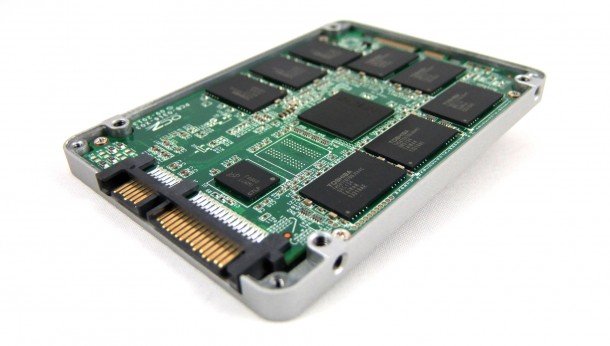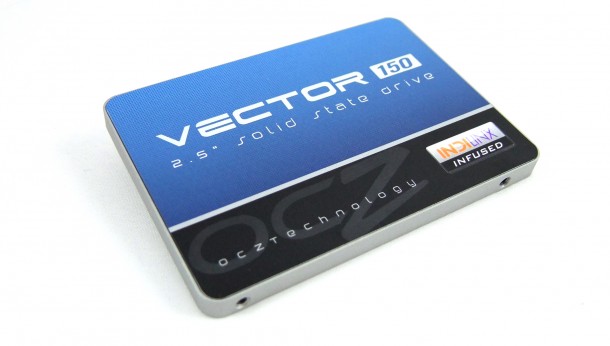Our Verdict
A particularly impressive new OCZ drive, especially when you dive into the real-world metrics
PC Gamer's got your back
Despite rumours of an OCZ collapse the wee SSD upstarts are still making new drives. This new OCZ Vector 150 is the cutting edge successor to their last top-end drive. It's packing new memory technology and some funky Flash management to ensure this drive lasts and OCZ have also got some impressive real-world numbers to back the Vector 150 up. In comparison with the might of Samsung, and their hugely successful SSD range, OCZ is a tiny company. But they got into the solid state game early and made the bold move of buying up their own memory controller creators, Indilinx. This makes them one of the few manufacturers not just using off-the-shelf Marvell or SandForce silicon in their drives, much like the Korean giant.
I was a big fan of the original OCZ Vector drive, which popped up around a year or so ago. It produced impressive 4K random performance and was knocking around the upper limits of the SATA 6Gbps for sequential read / write performance. Importantly they also offered a five year warranty with it too, helping us all forget the reliability worries which plagued the OCZ Vertex 4. This new Vector 150 takes that even further. It still offers the same five year warranty, but OCZ are now claiming much improved endurance for the NAND Flash memory at the heart of the drive. The original Vector was rated at 20GB/day writes for its lifetime, but OCZ have boosted that by 2.5x up to 50GB/day.
That's a huge boost in endurance, which is especially impressive given that they are using new NAND with a smaller production process and inherently lower endurance. The 19nm Toshiba NAND Flash is pretty much the top memory tech you can have in SSDs these days and OCZ have used a mixture of over-provisioning (which is why you get a 240GB capacity rather than 256GB) and some proprietary Flash management to achieve these touted endurance levels.
Synthetic SSD speed tests yield predictable results. For incompressible data it's a shade under the 500MB/s mark for both reads and writes, giving an almost identical display in my benchmarking suite as Samsung's 840 EVO 250GB SSD. The Samsung drive does give better 4K random read speeds, however, which might indicate it has a bit of an edge in rapid Windows performance.

OCZ have made some claims about improved sustained SSD performance, though, and my benchmarks certainly back that up. To demonstrate a real-world usage scenario I grabbed a chunky 38GB game folder and set both the Samsung and OCZ drives to copy it. The OCZ drives managed to keep its performance at a level comfortably above the Samsung for the duration of the extended copy. The 840 EVO took nearly five and a half minutes to copy the data, while on the same system the Vector 150 took around two minutes less.
That's a convincing display of real-world performance, and is likely down to the use of TurboWrite on the Samsung SSD. This uses a small amount of the drive's capacity as a sort of speedy SLC memory to enhance performance. For small amounts of data that's fine, but on the 120GB and 250GB drives it only comes with 3GB apportioned for the fake SLC memory and on such large data sets that runs out real quick.
OCZ are always going to come off second-best to the might of Samsung, however. The 840 EVO drives are incredible value thanks to Samsung's manufacturing might. Their 250GB SSD comes £50-odd cheaper than the slightly smaller OCZ drive at £200.
The Vector 150 though is rated to last longer, so if you're planning on not upgrading for a while the extra endurance of the OCZ drive might well be worth that £50 premium. And considering you're also getting quicker real-world performance too, the new Vector 150 drive makes a very good case for itself.
Benchmarks
In terms of the general synthetic performance on my Haswell-based test rig there's really not a lot of difference between the Vector 150 and the competing 840 EVO drive. But it's when you start throwing around a lot of data that things start to look good for OCZ.
Sequential read performance
AS SSD – MB/s: higher is better
OCZ Vector 150 – 497
OCZ Vector – 514
Samsung 840 EVO – 494
Sequential write performance
AS SSD – MB/s: higher is better
OCZ Vector 150 – 482
OCZ Vector – 494
Samsung 840 EVO – 482
Real-world data transfer performance
38GB file – Time in seconds: quicker is better
OCZ Vector 150 – 212
Samsung 840 EVO - 300
A particularly impressive new OCZ drive, especially when you dive into the real-world metrics

Dave has been gaming since the days of Zaxxon and Lady Bug on the Colecovision, and code books for the Commodore Vic 20 (Death Race 2000!). He built his first gaming PC at the tender age of 16, and finally finished bug-fixing the Cyrix-based system around a year later. When he dropped it out of the window. He first started writing for Official PlayStation Magazine and Xbox World many decades ago, then moved onto PC Format full-time, then PC Gamer, TechRadar, and T3 among others. Now he's back, writing about the nightmarish graphics card market, CPUs with more cores than sense, gaming laptops hotter than the sun, and SSDs more capacious than a Cybertruck.


